MarineCorps
Latest
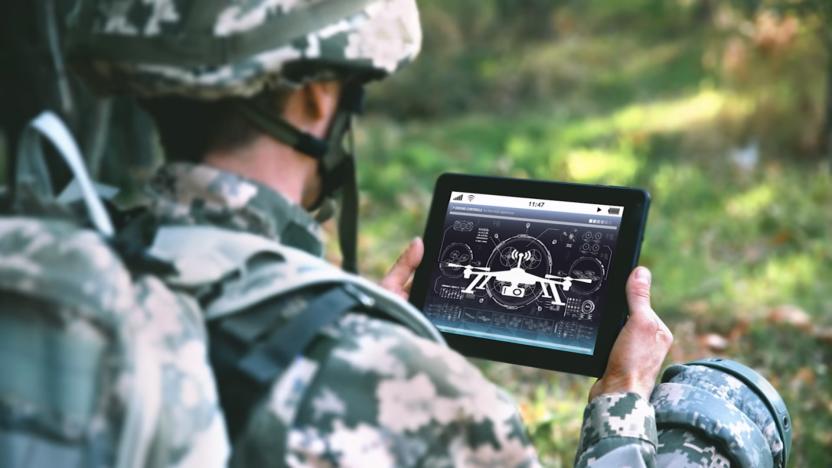
US Military tests system for on-demand 3D-printed drones
The US military has used drones in combat zones for over a decade to scout and support infantry. Now they're testing a way to give ground troops another edge: The capability to build UAVs themselves. What's more, the US Army is partnering with the Marine Corps on a test project that lets troops 3D-print particular drone parts from a tablet-based catalog, which could eventually lead to manufacturing UAVs customized to the mission.
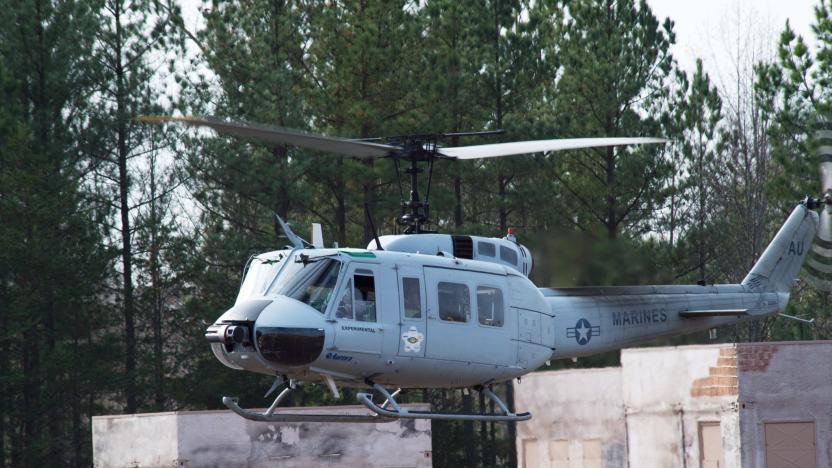
Autonomous helicopter completes Marine resupply simulation
Drones have become a part of the modern battlefield, but what about autonomous full-size aircraft? Aurora Flight Sciences just successfully demonstrated its self-flying setup, the Autonomous Aerial Cargo Utility System (AACUS), enabling an older helicopter to fly itself at soldiers' requests. In the future, troops in the field could use this tech to order autonomous supply deliveries with nothing more complicated than a tablet.
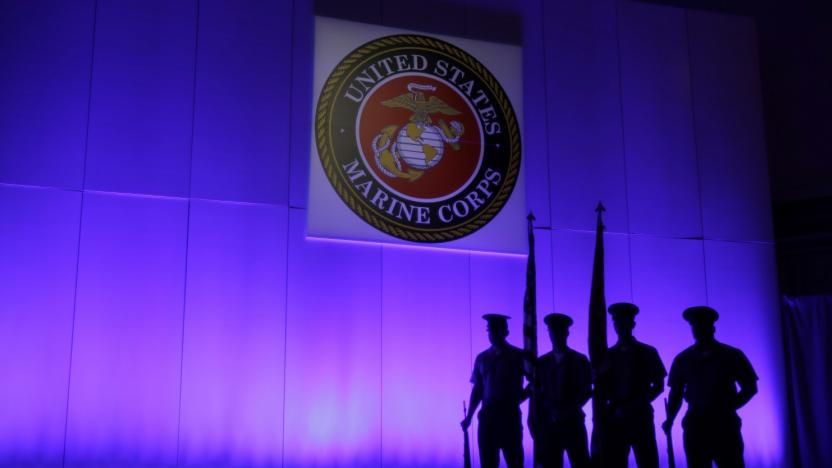
Two Marines punished for online misconduct under new policy
Two Marines have been disciplined for posting disrespectful comments about a female soldier on social media, The Washington Post reports. It's the first time the Marine Corps has officially punished someone for online misconduct since last month's nude photo scandal.
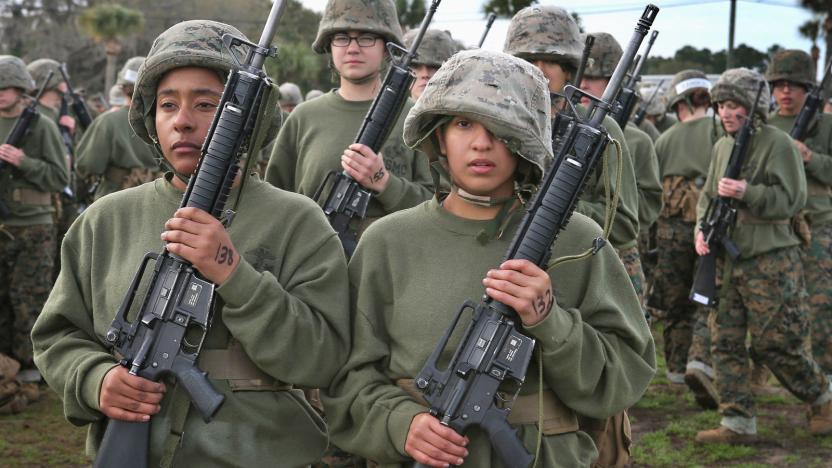
Marine Corps guidelines now ban online sexual harassment
The US Marine Corps has already started to crack down on soldiers sharing nude photos of women soldiers through internet groups, but it now has a better way of tackling this behavior. The military branch has published updated guidelines that explicitly forbid various forms of online sexual harassment, including "indecent viewing, visual recording, or broadcasting." Marines represent the Corps and their units "at all times," and that includes when they post on social networks.

Facebook group hosted naked photos of women soldiers
Private Facebook groups can be valuable discussion areas for like-minded people, but they can also promote toxic behavior in the wrong circumstances. The Center for Investigative Reporting has revealed that the US' Naval Criminal Investigative Service is looking into a Facebook group, Marines United, that was used by soldiers in the US and UK (including the Marine Corps, Navy Corpsman and Royal Marines) to share naked photos of servicewomen. While the group has had some above-board discussions, according to one anonymous veteran, it has been dominated by "creepy, stalker-like" photography, revenge porn and the vile talk to match. Over two dozen of the women were identified by their names and positions.

Obama pardons Stuxnet leak source James Cartwright
Chelsea Manning isn't the only source of online leaks to get a new lease on life. President Obama has pardoned General James Cartwright, who pleaded guilty to lying to the FBI when it investigated leaks that revealed details of Stuxnet, the US-backed malware that sabotaged Iran's nuclear program. He had denied slipping out classified details to two New York Times reporters (including book author David Sanger) in a 2012 interview with the Bureau, only to be caught out later on. He had been facing up to 5 years in prison and was due to be sentenced the same day as the pardon.
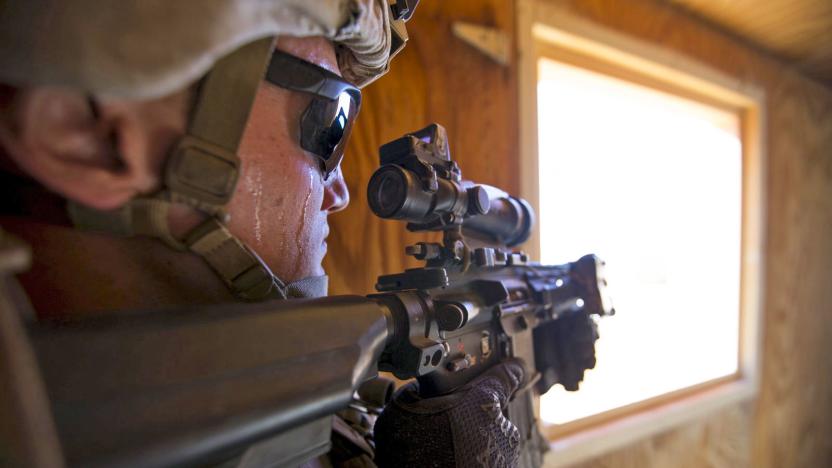
Smart body armor could gauge brain damage from explosions
Explosions are insidious. Even if a blast doesn't deliver a conspicuous injury, it can inflict brain trauma that might not be evident until much later. The US Navy's Office of Naval Research doesn't want medics to wait, though. It's developing Blast Load Assessment Sense and Test (conveniently, BLAST), a sensor system that could determine whether or not an explosion's shockwave is likely to have injured your brain. Tiny sensors in your helmet and body armor would record the blast pressure and share it with a scanner. When combined with a palm-sized neurological assessment tool (which stimulates your fingers to gauge your responses), the data would let medical teams quickly decide whether or not you're able to fight.

Watch an AlphaDog robot venture into (simulated) battle for the first time
They grow up so fast, don't they? It seems like only yesterday that Boston Dynamics' AlphaDog (aka LS3) robot was finding its legs, and yet it has already gone out on training exercises with the US Marine Corps for the first time. The cargo-hauling machine dutifully trotted behind a Marine squad traversing a simulated combat zone in Hawaii, proving that it could both navigate rough terrain and resupply other platoons that would otherwise have to wait for an ATV.

Boston Dynamics shows a quieter, more thoroughbred AlphaDog to DARPA and the Marines (video)
When we last saw Boston Dynamics' AlphaDog (aka LS3), it was strutting through outdoor trials with the subtlety of a nuclear missile: for all that noise, it might as well have been holding a "shoot here please" sign broadcasting American soldiers' positions to everyone in the forest. Several months later, the company is showing both DARPA and the Marine Corps a refined version of its load-carrying robot that has clearly been through a few rounds of obedience school. While we still wouldn't call the four-legged hauler stealthy, it's quiet enough to avoid the role of bullet magnet and lets nearby troops chat at reasonable volumes. And yes, there's new tricks as well. AlphaDog can speed up its travel over difficult surfaces and move at up to a 5MPH jog, all while it's following a human squad. DARPA and the Marines recently began testing and improving the robot over a two-year period that should culminate in an Advanced Warfighting Experiment with the Marines to test viability under stress. If AlphaDog passes that bar, there's a good chance many on-foot soldiers will have a mechanical companion -- and quite a weight lifted off of their shoulders.

Singapore to hand out iPads to its soldiers
The Defence Ministry of Singapore said on Monday that it will be issuing 8,000 iPads to new recruits this year. Armed with the iPad, new soldiers will be able to snap photos and videos of the battlefield, which can be uploaded to a central database. They can also communicate with officers and other soldiers via messaging. The Singapore Armed Forces wants to expand the iPad's capabilities and is working with private contractors to create secure apps for military use. The iPad program begins this year with new recruits and will extend to other soldiers next year. This is not the first example of military units using the iPad and other iOS devices. US Marine Corp aviators recently replaced their paper-based navigation system with one driven by the iPad, and the Army is working on its own secure App Store. In the UK, soldiers are using the iPad to train for combat before their deployment for Afghanistan. The Army App Store is work in progress, while the USMC and UK programs are considered an early success by their respective military leaders.

Marine Corps aviators depend on iPad
Aviators for the United States Marine Corps (USMC) in Afghanistan have ejected heavy stacks of paper charts and grid reference graphics from their cockpits and replaced them with the iPad according to a report by Tony Osborne for The Shephard Group. The popularity of the iPad among marine flight crews took off last November when one Cobra pilot figured out how to load digital maps onto the device. In Afghanistan, identifying compounds and landmarks from the air can be difficult. To eliminate guesswork and better coordinate missions with international ground forces, USMC pilots arm themselves with a plethora of maps of the region. Prior to digitization, paper charts and grids would fill cramped cockpits and require additional training and attention to read correctly. The iPad saves space and allows pilots to search for locations with a few quick taps of their fingers, making it significantly easier for aviators to identify compounds and quickly offer air support. "It's a game changer," Capt. John Belsha told The Shephard Group. "It's all about sharing situational awareness and using the iPad is much better than using a paper chart." Work is reportedly underway to integrate the iPad into aircraft in the US to allow Marine aviators to receive flight training with digital maps. USMC pilots aren't the only group embracing iPads in the cockpit. Earlier this month, Alaska Airlines announced plans to replace various flight, systems, and performance manuals (and eventually paper aeronautical charts) with digital copies on the iPad. Apple's tablet would eliminate up to 50 pounds of paper that its pilots must lug onto every flight.

Apple's iPod touch tackling "networked warfare" for US military
While the British military has had a love-hate relationship with Apple's darling, the US armed forces are reportedly warming up quite well to the iPod touch. A fresh Newsweek report asserts that the touch is increasingly replacing far more expensive dedicated devices in the field, noting that it is being used to spearhead the future of "networked warfare." Equipped with a rugged shell and software developed by language translation firms (among others), the device is being used to aid communications and acquire information from databases. In fact, the US Department of Defense is "developing military software for iPods that enables soldiers to display aerial video from drones and have teleconferences with intelligence agents halfway across the globe," and snipers are already utilizing a ballistics calculator to add precision to shots. And hey, it's not like easy access to Tap Tap Revenge is really bad for morale, either.[Via CNET]

Serious Games Summit: A military takeover of serious games
Things have come a long way since the U.S. Armed Forces got into the video game business with Marine Doom in the early '90s. Just ask Roger Smith, an analyst who presented on the past, present and future of military involvement in games at the Serious Games Summit. In the dozen or so years since their shallow, graphical Doom II mod, Smith said the military has integrated full-fledged training simulations for all sorts of different positions and situations. Right now most of that training goes to the "trigger pullers" -- the people risking their lives on the front lines -- but Smith said lower-cost technology solutions would allow for simulations geared towards medical, logistical, maintenance, and other troops who currently don't have many other training options.While recent military sims like America's Army and Full Spectrum Warrior have crossed over into the commercial market, Smith said he sees this trend slowing in the future, with the military developing narrowly targeted simulations suited specifically for military use, not living room use. As this trend continues, Smith sees the military developing internal game development resources to create its games, rather than buying off-the-shelf parts and talent from outside game companies.Smith also talked excitedly about the military's interest in developing for the Xbox 360 through the XNA program. While there were too many roadblocks to developing military trainers for the original Xbox, Smith said a simulation designed for powerful, affordable hardware like the 360 had the potential to open up training to every soldier, rather than just those in units with access to expensive, high-end PCs.Also see: Serious Games Summit: Defense dept. games




